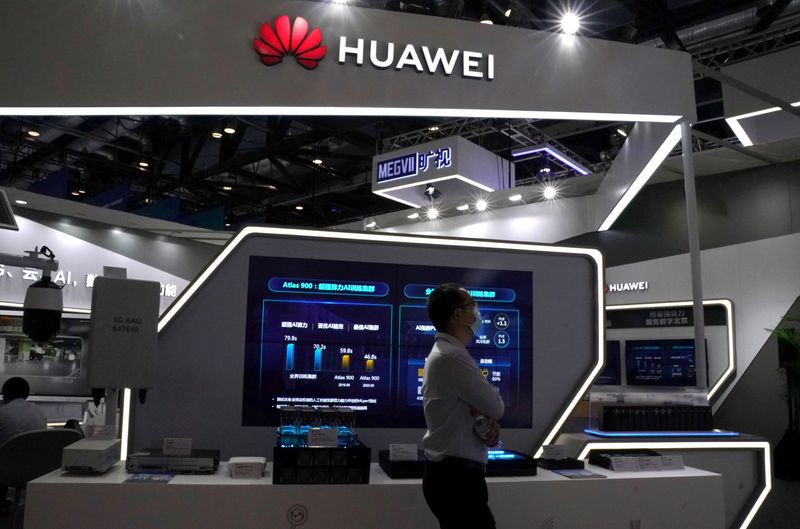By Andreas Rinke and Douglas Busvine
BERLIN (Reuters) - The German government is planning tougher oversight of telecoms network vendors that, while stopping short of a ban on Huawei [HWT.UL], will make it harder for the Chinese company to keep a foothold in Europe's largest market.
Three coalition and government sources said on Wednesday that an agreement had been reached in principle to extend scrutiny of a vendor's governance and technology to Radio Access Networks (RAN) powering next-generation 5G services, in addition to the more sensitive core.
The Handelsblatt daily reported earlier that, after two years of wrangling, Chancellor Angela Merkel's coalition had agreed on a formula for how to handle so-called high-risk vendors in a proposed IT security law.
Merkel's spokesman, Steffen Seibert, declined to comment on the Handelsblatt story, telling a government news conference that the same security standards would apply to all vendors. The interior and economy ministries, both run by Merkel allies, said discussions on the legislation were continuing.
European governments have been reviewing market leader Huawei's role in the building of their networks following pressure from the United States, which says it poses a security threat because, among other concerns, Chinese companies and citizens must by law aid the state in intelligence gathering.
Restricting Huawei is the right approach, a senior U.S. official said, urging Berlin to support its NATO allies by removing Chinese technology from its next-generation networks.
"We are seeing things moving in the right direction in Germany ... There is really no future with Huawei," said Keith Krach, the U.S. undersecretary of state for economic affairs who has visited Berlin and Brussels in recent days.
Huawei denies it poses a security risk. It said it could not comment on a measure that was still being drafted, but highlighted its 30-year track record of delivering safe networks and transparent cooperation with the German authorities.
"We cannot identify any comprehensible reasons for restricting our market access," Huawei's German spokesman said.
German officials say that, while Britain has formally banned Huawei and France will informally exclude it, Germany will eventually strangle it in red tape. "The final outcome is the same," one senior security official has told Reuters.
POLITICAL JUDGEMENTS
Scrutiny of vendors would include up-front and ongoing assessments by Germany's cybersecurity watchdog and intelligence services, subject to a judgement from key government departments on whether a vendor is trustworthy, some sources said.
Exactly who has a seat at the table for that political call remains a subject of debate, with Merkel's coalition partners the Social Democrats, who run the foreign ministry, pushing to have a say.
The compromise still needs to be drafted into a legal text: "We hope that cabinet can adopt this in October, or at the latest in November," said one coalition source.
Germany's three mobile network operators - Deutsche Telekom (OTC:DTEGY), Vodafone (NASDAQ:VOD) and Telefonica (NYSE:TEF) Deutschland - are all clients of Huawei and have argued that ripping out and replacing its equipment would be costly.

Market leader Deutsche Telekom's 5G network, built largely with Huawei equipment, should cover two-thirds of the German population by the end of the year, meaning it will be largely completed by the time IT security law takes effect.